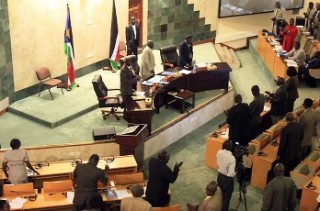S. Sudan parliament passes security bill amid protests
October 8, 2014 (JUBA) – South Sudan’s parliament have passed a new national security bill in its fourth and final reading on Wednesday despite a walk-out by opposition members and a section of ruling party lawmakers.

Minority leader Onyoti Adigo, of the opposition SPLM-DC, said the latest sitting should have been adjourned for at least 72 hours, as stipulated in the parliamentary code of business conduct, to give MPs more time to read additional amendments made to the bill.
“As the official opposition in this parliament, I requested that this has to be suspended, but the ruling party (SPLM) is saying no, because they have been sitting on it and they know what is happening. We are going to leave the house and you remain discussing. We will not be [a part] of it,” said Adigo prior to walking out in protest, along with other SPLM-DC MPs.
About 20 MPs representing Eastern, Central and Western Equatoria states also questioned the parliamentary proceedings and before leaving the house.
The group, led by Eastern Equatoria MP Hentry Odua, told reporters outside parliament that the bill gives security agents sweeping powers.
“The speaker bulldozed [the proceeding and] they are going to push through a controversial bill to govern this country,” said Odua.
“I think that leaves a lot to say about which direction this country is going,” he added.
Lawmakers last week cancelled a scheduled debate on a bill at the last minute on Thursday, and further delaying the adoption of the document.
The delay came after MPs had raised concerns over the powers granted to the NSS in the bill to arrest “any person suspected of committing a crime or about to commit” a crime, although the item was subsequently amended to read “suspects”.
At the time, the chairperson of defence, security and public order, Samuel Duwar Deng, said the reason for the delay was also to allow MPs more time to read the full text of the document and the amendments.
Deng this week applauded the passing of the bill, describing it as a joyful occasion.
“It is actually very good. It is joyful to the people of South Sudan and to the [national security] service itself, because from here we will be assured the work of the service will be running smoothly,” Deng told reporters after MPs passed the bill.
Salva Mathok, an SPLM MP from Warrap state, says MPs who walked out did so as is their right, adding their decision should not be interpreted as meaning the parliament is sharply divided.
“Any member of parliament who is discontented with that item or agenda being discussed can just go out and it is not a new thing,” he said.
“Even myself, if I was not in [support of] that line I would have even walked out with them,” he added.
The bill now has to be signed by president Salva Kiir in order to be passed into law.
In a statement released last Friday, the US said it was “deeply concerned” by elements in the bill that sought to regulate the operations of non-government organisations.
“We are deeply concerned that the current NGO bill, as drafted, could restrict civil society space and hinder the formation and operation of NGOs. As the leading donor of humanitarian and development assistances in South Sudan, we are particularly concerned that this bill would further restrict the delivery of life-saving humanitarian assistance and limit the important work that NGOs are doing to promote health, education and overall development,” US state department spokesperson Jen Psaki said in the statement.
Human rights groups have also raised concerns over the bill, calling for it to be overhauled to ensure that it conforms with international standards.
Amnesty International described this mandate, which grants the NSS “virtually unrestricted powers of arrest, search and seizure” as “fundamentally flawed”, and against domestic and international laws.
Analysts argue that the draft bill does not mention legally permissible places of detention and does not guarantee the right of individuals detained to effective defense or the constitutional right to communicate in private with a lawyer at the moment of arrest.
“While the National Security Service urgently needs a legal mandate, any law passed must ensure appropriate limits on its powers and provide individuals adequate opportunity for redress. It grants officers immunity from criminal proceedings, opening the door to impunity,” said Amnesty International researcher Elizabeth Deng.
Meanwhile, the US-based Human Rights Watch (HRW) also called for the draft legislation to be amended to regulate the powers of the NSS amid fears the bill would “sanction the national security service’s abusive and unlawful detentions and interrogations”.
(ST)
– Rights body urges S. Sudanese lawmakers to reject security bill
– Security bill: US calls for inclusive consultations in S. Sudan
– S. Sudan parliament delays security bill discussions for second time
